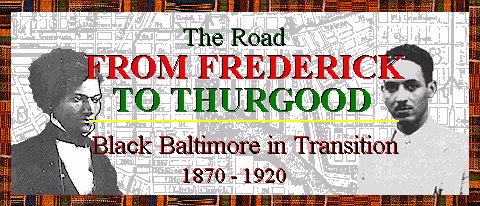 |
John W. Locks:Political Leadership & Organizational Affiliations |
 |
John W. Locks:Political Leadership & Organizational Affiliations |
John Locks inherited the mantle of leadership among black Republicans after the death of George Hackett. Together with other local African Americans, Locks fought to make the Republican party live up its promise to treat all men equally regardless of race. In 1873, Locks was chosen to be the chairman of a convention of black Republicans concerned with their relationship with the party, particularly the distribution of political patronage. Locks wanted African Americans to have jobs at all levels of government, but did not want to disrupt "harmonious" relations with the Republican party's white leadership. Locks helped form a delegation of prominent African American Republicans to appeal to the Baltimore City government to open more official employment opportunities to African Americans.
In 1879, Locks and Dr. H. J. Brown, among others, traveled to Nashville to attend a national convention. The gathering intended to address issues concerning black Americans across the country. The Maryland delegation's experience with the 1870 Baltimore celebration of the Fifteenth Amendment proved helpful in planning nationwide events nearly a decade after ratification. In 1880, Baltimore's Colored Republicans selected Locks to represent them at the National Convention in Washington D. C. However, the state convention chose not to include Locks, although he had "been promised a seat by the so-called liberal Grant-wing of the party." Members of the local Colored Republicans held a meeting to protest Locks' exclusion from the convention by the state leaders.
Locks' setback in party politics did not diminish his political activities. He turned his efforts toward local issues in Baltimore. Locks fought for years to improve opportunities for African Americans in education. He joined with other community leaders to urge the establishment of black public schools and to promote the hiring of black teachers in existing schools. Locks was one of three black trustees on the integrated board of the Howard Normal School, established in 1867 by "philanthropic whites." In 1870, Locks, along with John A. Fernandis, Causeman Gaines, and many others, signed a petition "demanding that black teachers be hired." Locks regularly participated in committees to increase educational opportunities for black children and teachers. His efforts eventually succeeded, although he was not to see the results himself. Only four years after his death, Roberta Sheridan became the first black teacher appointed to teach in Baltimore's public schools.
Locks was also active in his community through social and benevolent organizations. Locks, like other prominent African Americans, built professional relationships through membership in various fraternal and beneficial societies. Locks was a member of the Olive Lodge 967 and the Grand United Order of Odd Fellows. He helped give back to his community by his participation in the Rising Star, Morning Star, and Evening Star Beneficial Societies. Locks was also president of the Maryland Emigration Aid Society, an organization that planned to use steamships to bring African Americans from the southern United States to Baltimore and other cities of the north in an attempt to strengthen the black communities in the cities and provide opportunities to freedmen from the former slave states.
![]() Return
to "Civil Rights & Politics" Introduction
Return
to "Civil Rights & Politics" Introduction
![]() Return
to The Road From Frederick To Thurgood Introduction
Return
to The Road From Frederick To Thurgood Introduction
|
Tell Us What You Think About the Maryland State Archives Website!
|
© Copyright February 03, 1998 Maryland State Archives